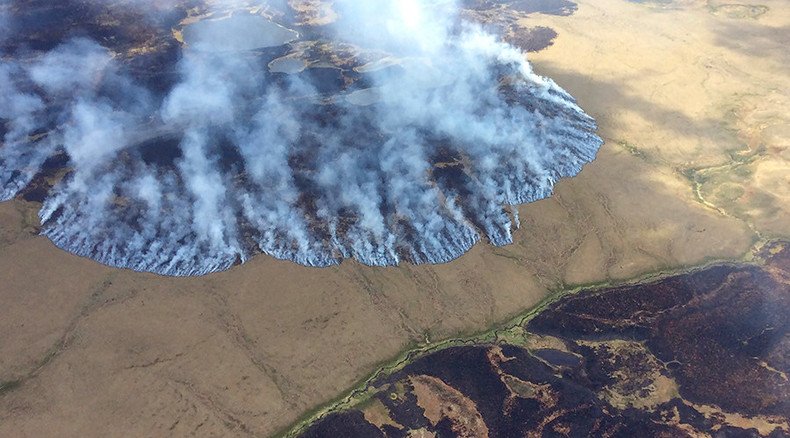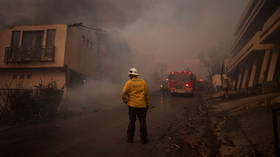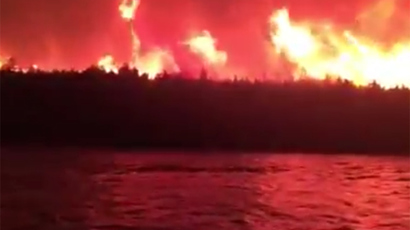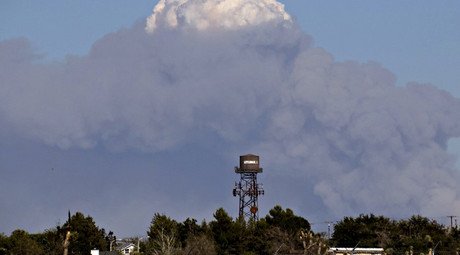Alaska wildfires exacerbate climate change, as permafrost releases masses of ancient carbon – report

Wildfires in Alaska this summer that have burned almost 5 million acres total are now threatening to melt permafrost below the ground surface which contains carbon, a leading driver of global climate change.
While the advance of the Fish Creek Fire – one of around 300 wildfires that broke out in Alaska this summer – near Fairbanks has slowed considerably, the after-effects of the lightning-borne blaze will linger.
Biomass on the ground that does not decompose in the higher elevations of Alaska is next to feel the heat. Below that mass of grasses and brush is underground permafrost, which can contain a significant more amount of carbon-based material than aboveground, NPR reported.
Though wildfires in Alaska and Canada are common, blazes have burned more than 11 million acres total amid a fire season that is still early, according to experts. As fires burn through layers of organic material, the permafrost weakens and long-trapped carbon is released, according to Ted Schurr, a professor at the University of Northern Arizona who studies permafrost.
Great viz by @PostGraphics of wildfires atop permafrost regions in Alaska http://t.co/t2td7OlRHppic.twitter.com/EZTc3T9c8v
— Chris Mooney (@chriscmooney) July 27, 2015"The Arctic and the boreal regions are a hotspot of carbon that's stored in the biosphere that has some vulnerability of ending up in the atmosphere as the climate changes," Schurr said.
Schurr added that "there's about twice as much frozen carbon [in the global north's permafrost] as there is in the atmosphere, to the tune of about 1,700 billion tons of carbon stored frozen."
There's another 2,000 billion tons of carbon stowed away in soil and vegetation throughout the rest of the world, he said.
Smoke goes around the world. Alaska & Canada wildfires could impact larger area: http://t.co/cQzeOefUv9@NASANPPpic.twitter.com/igFiSXLyaO
— NASA (@NASA) July 23, 2015The melting permafrost adds to the already worrying trends in Alaska, where it has warmed by more than 3 degrees Fahrenheit in the previous 50 years while losing 75 metric tons of ice from its glaciers each year. Three of the top five wildfire seasons in Alaska have occurred since 2004, the record year that 2015 is on pace to eclipse.
How the 2015 wildfire season stacks up against historical records (1950 is threshold for reliable & complete records) pic.twitter.com/iwAO1qP8mh
— Scott Rupp (@TScottRupp) July 14, 2015As temperatures warm and fires continue to erase protective ground layers, more permafrost is vulnerable.
“The more severe the fire, the deeper that it burns through the organic layer, the higher the chance it will go through this complete conversion,” Schuur told The Washington Post. “What happens in the summer of 2015 has the potential to change the whole trajectory of [the burned area] for the next 100 years or more.”
While some experts believe the local ecosystem can handle new carbon through the creation of new vegetation, others believe that the carbon-releasing permafrost is outside the bounds of the environment's abilities to cope.
"The atmosphere thought it lost that carbon and all of a sudden it's being returned to the atmosphere after a prolonged period of time," Merritt Turetsky, a research ecologist from the University of Guelph in Canada, told NPR.
"That's the kind of carbon pulse to the atmosphere that actually can invoke additional climate change, above and beyond human emissions."














